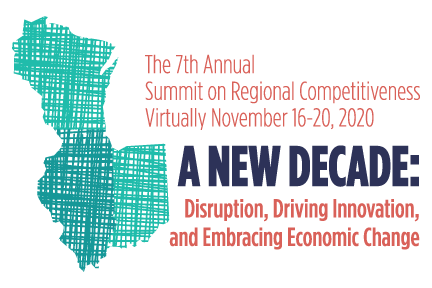The Seventh Annual Summit on Regional Competitiveness
The Alliance for Regional Development, in partnership with the Federal Reserve Bank of Chicago, hosted the Seventh Annual Summit on Regional Competitiveness—A New Decade: Disruption, Driving Innovation, and Embracing Economic Change—virtually on November 16–20, 2020. This weeklong event featured more than 35 high-profile international, regional, and local thought leaders participating on panels and delivering keynote speeches.
Experts suggest that the Covid-19 pandemic has resulted in a decade’s worth of disruption in just six months across much of the Midwest this year. While this has increased the level of uncertainty, the social and economic forces driving interruptions in markets and value chains can serve as catalysts for societal and technological advancement. Our conversations will center on the state of trust in the global institutions that underpin our society, how the pandemic has accentuated the digital divide between urban and rural communities, and potential solutions to these concerns. Additionally, speakers discussed the state of the economy, society’s increased reliance on technology and artificial intelligence in the workplace, and the growing importance of lifelong learning in the labor market.
Innovation is crucial for economic growth, and one focus of the summit included how disruption can drive innovation in the transportation sector. As noted by the OECD in its territorial review, the Mega-Region—defined as the Milwaukee area, Chicagoland, and Northwest Indiana—serves as the premier transportation hub for North America. Programming covered the impact of advanced mobility solutions, the effect of increasing electrification and automation of mobility options, and the role of maritime commerce in the Mega-Region.
The forum explored how government—at both the local and federal level—is adopting policies to address equity issues in an environment of economic uncertainty. Our speakers explained and explored how our federal agencies in the tri-state region are deploying resources to promote greater coordination and cooperation at the regional level. Chicago Mayor Lori Lightfoot, Milwaukee Mayor Tom Barrett, and Gary Mayor Jerome Prince also joined us in a historic panel—the first one to bring together all three mayors from the Mega-Region—to discuss the impacts of Covid-19 on their communities and their visions for a post-pandemic world.
The Seventh Annual Summit on Regional Competitiveness

The Alliance for Regional Development, in partnership with the Federal Reserve Bank of Chicago, hosted the Seventh Annual Summit on Regional Competitiveness—A New Decade: Disruption, Driving Innovation, and Embracing Economic Change—virtually on November 16–20, 2020. This weeklong event featured more than 35 high-profile international, regional, and local thought leaders participating on panels and delivering keynote speeches.
Experts suggest that the Covid-19 pandemic has resulted in a decade’s worth of disruption in just six months across much of the Midwest this year. While this has increased the level of uncertainty, the social and economic forces driving interruptions in markets and value chains can serve as catalysts for societal and technological advancement. Our conversations will center on the state of trust in the global institutions that underpin our society, how the pandemic has accentuated the digital divide between urban and rural communities, and potential solutions to these concerns. Additionally, speakers discussed the state of the economy, society’s increased reliance on technology and artificial intelligence in the workplace, and the growing importance of lifelong learning in the labor market.
Innovation is crucial for economic growth, and one focus of the summit included how disruption can drive innovation in the transportation sector. As noted by the OECD in its territorial review, the Mega-Region—defined as the Milwaukee area, Chicagoland, and Northwest Indiana—serves as the premier transportation hub for North America. Programming covered the impact of advanced mobility solutions, the effect of increasing electrification and automation of mobility options, and the role of maritime commerce in the Mega-Region.
The forum explored how government—at both the local and federal level—is adopting policies to address equity issues in an environment of economic uncertainty. Our speakers explained and explored how our federal agencies in the tri-state region are deploying resources to promote greater coordination and cooperation at the regional level. Chicago Mayor Lori Lightfoot, Milwaukee Mayor Tom Barrett, and Gary Mayor Jerome Prince also joined us in a historic panel—the first one to bring together all three mayors from the Mega-Region—to discuss the impacts of Covid-19 on their communities and their visions for a post-pandemic world.
An Interview with Austan Goolsbee









